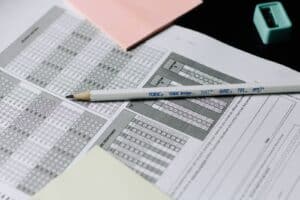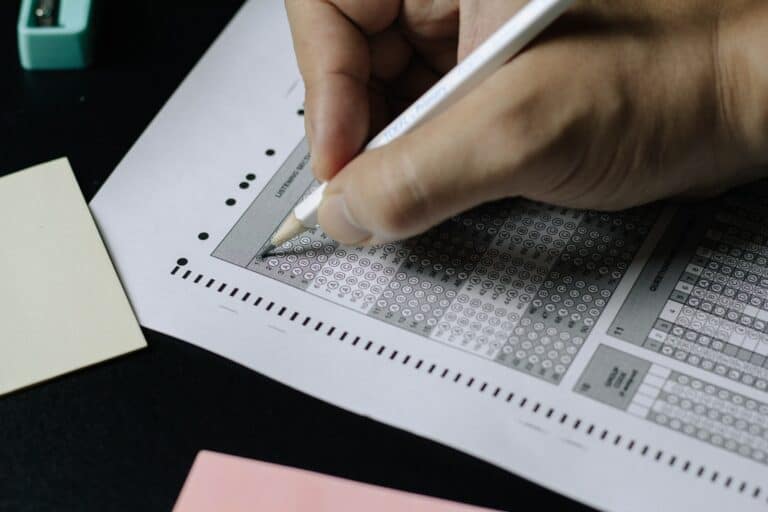How many questions are on the GED test? If you’re considering taking the General Educational Development (GED) test, it’s essential to have a clear understanding of its structure and content. The number of questions on the GED test varies depending on the subject area being assessed.
In this article, we will provide you with information on the number of questions on the GED test. We will also discuss the overall format of the GED test and the time allotted for the exam. We will offer tips on how to prepare for the GED test and provide suggestions for success on the exam. If you are considering taking the GED test, this article will provide you with the information you need to get started.
Overview of the GED Test Format
The GED test is composed of four subject tests: mathematics, science, social studies, and language arts (reading and writing). The subject tests are designed to measure knowledge and skills typically acquired during four years of high school.
The mathematics test covers topics such as algebra, geometry, and statistics. The science test covers topics such as physical science, life science, and earth and space science. The social studies test covers topics such as history, geography, and government. The language arts test consists of two parts: a reading test and a writing test. The reading test measures your ability to comprehend and analyze written materials, while the writing test measures your ability to write clear and coherent essays.

The GED test is offered in both computer-based and paper-based formats. The computer-based test is typically taken at a testing center, while the paper-based test may be taken at a testing center or at an approved location such as a school or community center.
The GED test is a timed exam, with a specific amount of time allotted for each subject test. It is important to manage your time effectively during the GED test in order to ensure that you are able to complete all of the questions.
How Many Questions Are on the GED Test?
The GED test is composed of multiple-choice and short-answer questions, as well as an essay. The number of questions on the GED test varies by subject and by test format.
On the computer-based GED test, the mathematics test consists of 46 questions, the science test consists of 40 questions, the social studies test consists of 35 questions, and the language arts test consists of 45 questions for the reading test and two essays for the writing test.
On the paper-based GED test, the mathematics test consists of 50 questions, the science test consists of 50 questions, the social studies test consists of 50 questions, and the language arts test consists of 50 questions for the reading test and two essays for the writing test.

It is important to note that the number of questions on the GED test may vary depending on the specific test form you are taking. Be sure to check with your local testing center or the GED Testing Service for the most up-to-date information on the number of questions on the GED test.
Time allotted for the GED test
The GED test is a timed exam, with a specific amount of time allotted for each subject test. The time allotted for the GED test varies by subject and by test format.
On the computer-based GED test, the mathematics test is allotted 115 minutes, the science test is allotted 90 minutes, the social studies test is allotted 70 minutes, and the language arts test is allotted 150 minutes, with 45 minutes for the reading test and 60 minutes for the writing test.
On the paper-based GED test, the mathematics test is allotted 115 minutes, the science test is allotted 90 minutes, the social studies test is allotted 70 minutes, and the language arts test is allotted 150 minutes, with 45 minutes for the reading test and 60 minutes for the writing test.
It is important to manage your time effectively during the GED test in order to ensure that you have enough time to complete all of the questions. Be sure to check with your local testing center or the GED Testing Service for the most up-to-date information on the time allotted for the GED test.
How to Prepare for the Ged Test
Proper preparation is an important step in the process of taking the GED test. By reviewing the material covered on the test and taking practice tests, you can increase your chances of success on the GED test.
Here are a few steps you can take to prepare for the GED test:
- Review the material covered on the test: The GED test covers four subject areas: mathematics, science, social studies, and language arts (reading and writing). You can review the material covered on the test by going over your old high school textbooks or using online resources.
- Take practice tests: Practice tests can help you get a feel for the types of questions that will be on the GED test and can help you identify areas where you need to focus your studies. You can find practice tests online or in GED study guides.
- Consider taking a GED prep class: GED prep classes are offered by many adult education centers and can be a helpful way to review the material covered on the test. These classes are typically taught by experienced instructors who can provide guidance and support as you prepare for the test.
- Get a good night’s sleep: Make sure to get a good night’s sleep the night before the GED test. Being well-rested can help you stay focused and perform your best on the exam.
By following these steps and making a plan to review the material covered on the GED test, you can increase your chances of success on the GED.
Tips for Success on the Ged Test
In addition to proper preparation, there are a few things you can do to increase your chances of success on the GED test. Here are a few tips for success on the GED test:
- Be familiar with the test format: The GED test is composed of multiple-choice and short-answer questions, as well as an essay. It is important to be familiar with the test format so that you know what to expect on exam day.
- Review the material covered on the test: The GED test covers four subject areas: mathematics, science, social studies, and language arts (reading and writing). It is important to review the material covered in these subjects so that you are well-prepared for the test.
- Manage your time effectively: The GED test is a timed exam, so it is important to manage your time effectively. Make sure to pace yourself so that you have enough time to complete all of the questions.
- Read the instructions carefully: Be sure to read the instructions for each section of the GED test carefully. This will help you understand what is being asked of you and how to approach each question.
- Stay calm: It is natural to feel nervous on exam day, but it is important to stay calm and focused. Take a few deep breaths and try to relax before the test begins.
By following these tips, you can increase your chances of success on the GED. Good luck!
